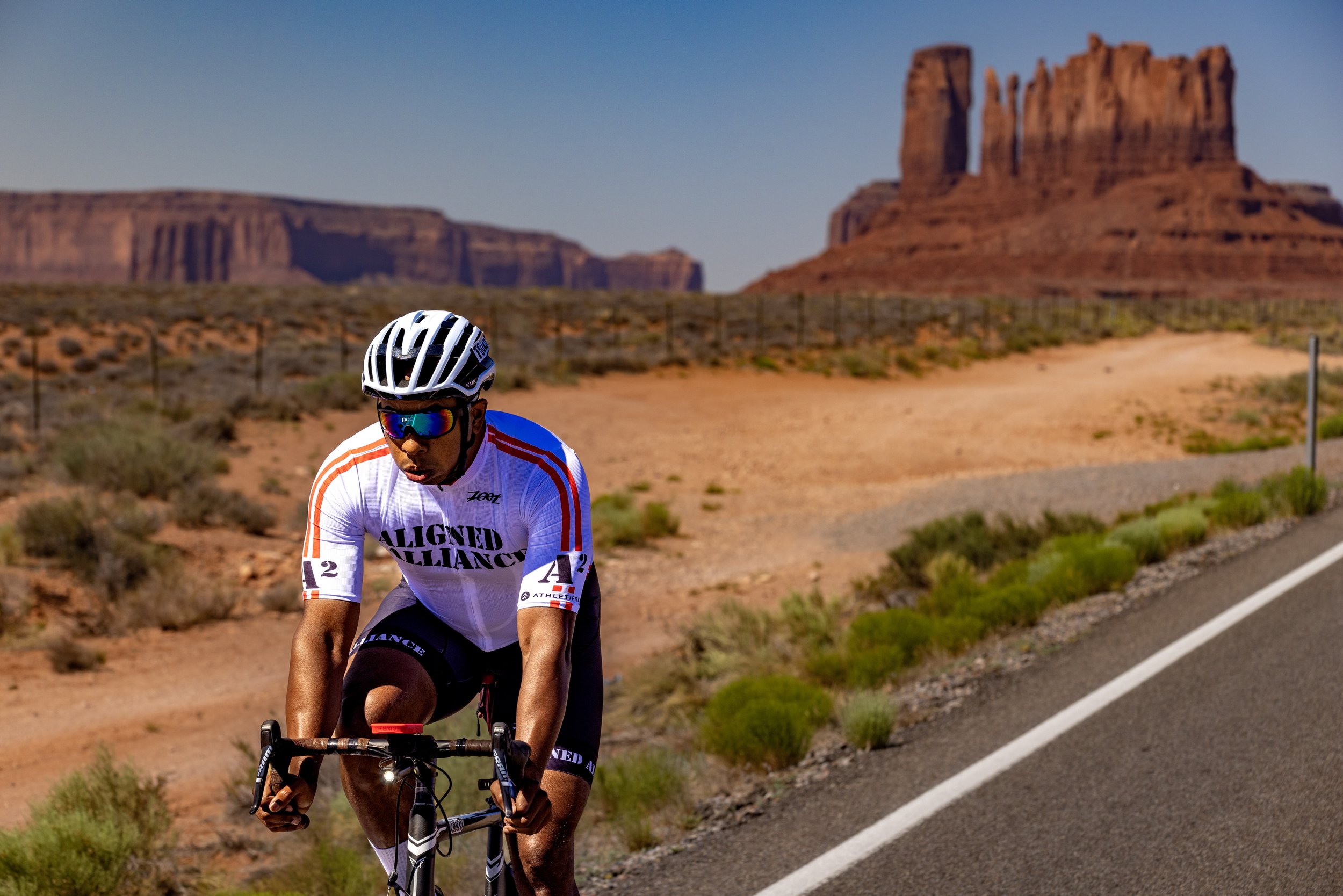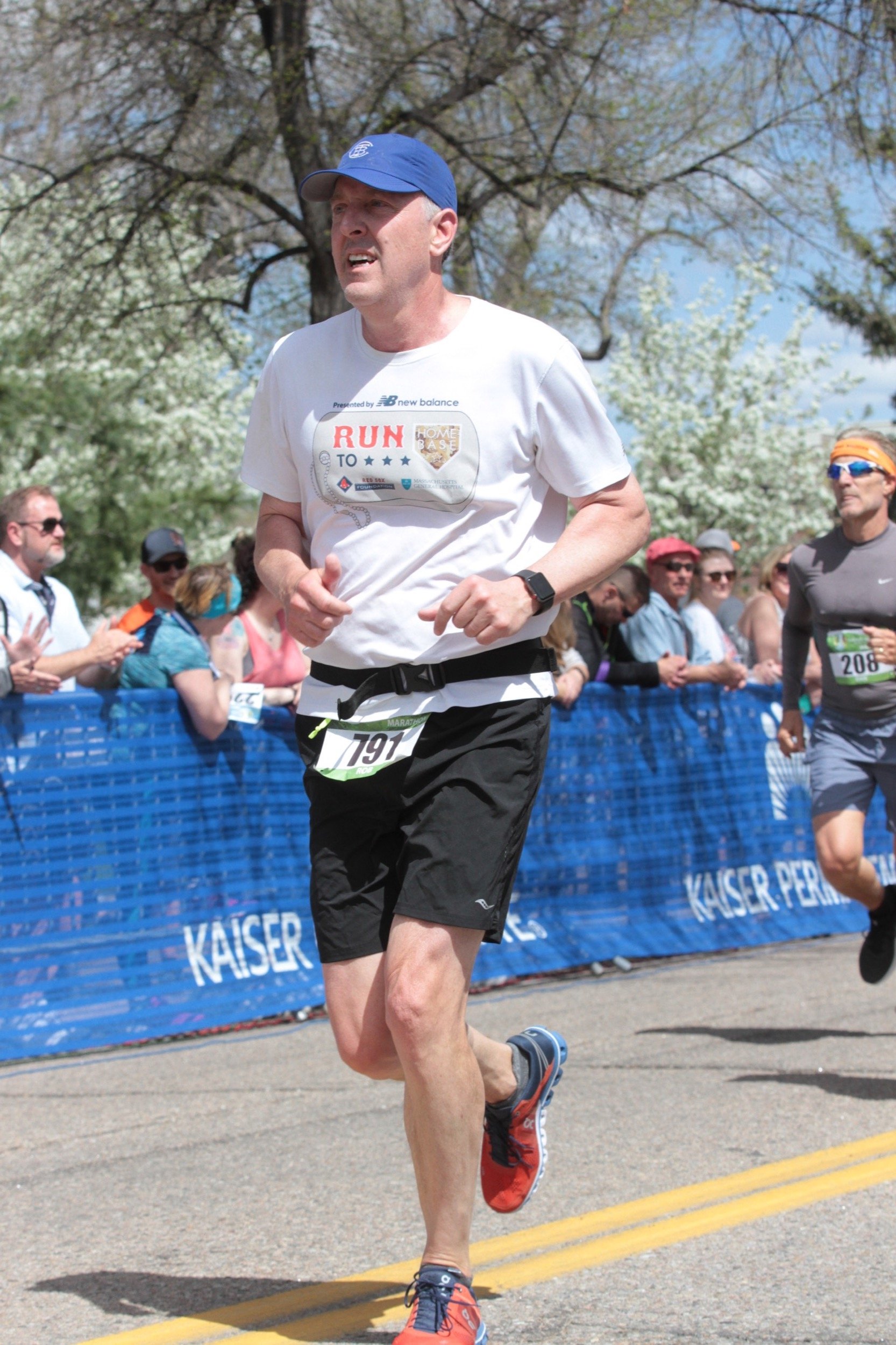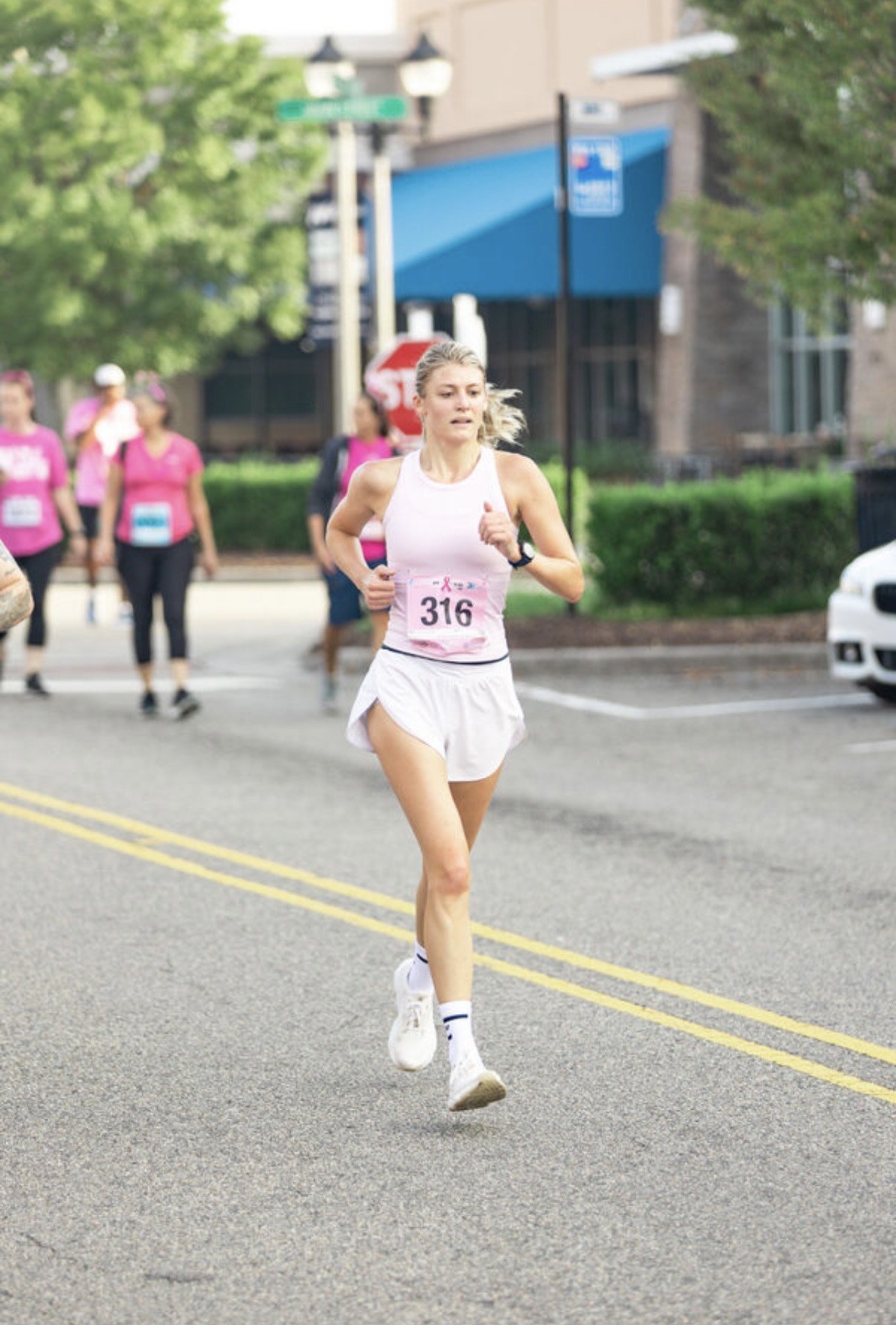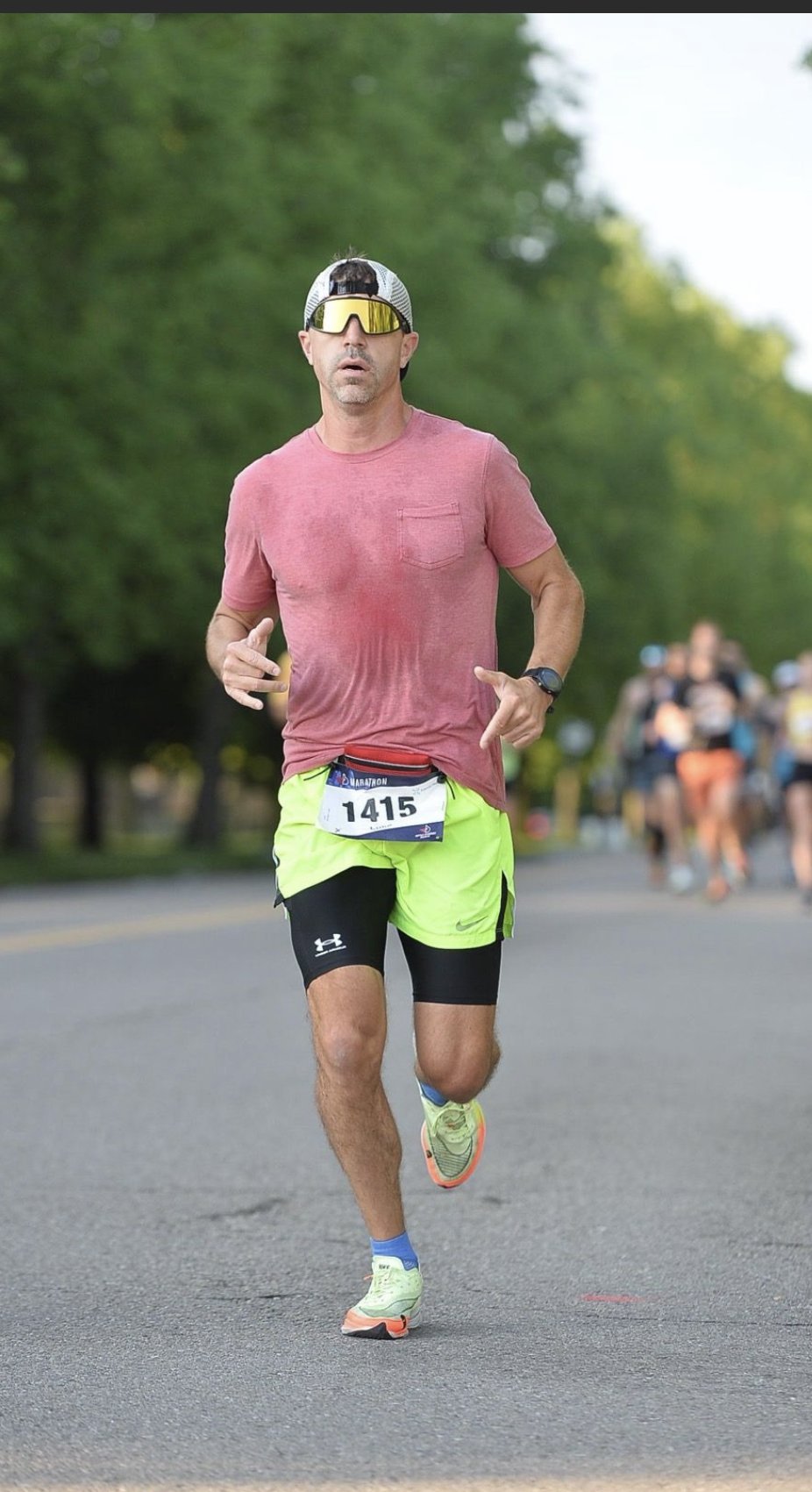Guardian Champion: Atlantic Ocean Row
Guardian Champion Keith Eckert has completed yet another incredible adventure with a mission of raising awareness & funds for Guardian Revival and mental health.
Keith and 11 other rowers crossed the Atlantic Ocean — rowing from Tenerife to Antigua in 45 days.
The crew was greeted by friends and family to the sounds of horn blasts from the superyachts in Falmouth Harbor upon their arrival on January 16, after 6.5 weeks of rowing.
Our Champion, Keith, was in good spirits despite being 16 pounds lighter than when he left Spain and walking on wobbly legs after being away from dry land for so long. He immediately enjoyed a fresh water shower and a proper meal that had not been freeze dried.
During their time at sea, the crew encountered huge storms, terrifying waves, beautiful wildlife, and stunning night skies.
All photos in this post are thanks to GR photographer Patrick Sikes, who traveled to Tenerife and Antigua to capture footage of the trip’s departure & arrival. Thank you, Patrick!
Rannoch Roxy 2023-24 Atlantic Ocean Row
In 6.5 weeks, twelve individuals rowed across the Atlantic Ocean, from Tenerife, Spain, to Antigua.
Rannoch Adventure is a premier ocean rowing company, building boats and organizing expeditions across oceans for over a decade.
One of the rowers on this trip, Keith Eckert, has been a recurring Champion for Guardian Revival, and his mission was not only to complete this grueling journey but also raise awareness and funds for our organization and the guardians we serve.
The team followed the "trade winds route," covering 3,000 miles in unpredictable weather, rough seas, strong currents, and isolation. The rowers faced fatigue, sleep deprivation, intense physical exertion, and the constant threat of capsizing or equipment failure. However, with determination and teamwork, they overcame these obstacles and pushed forward to Antigua.
Keith’s Reflection on the Epic Row
One of our GR photographers, Patrick Sikes, met Keith in Antigua to get photos of their arrival and interview Keith about this incredible adventure.
How does it feel to be on dry land?
It feels good to be back on dry land. My legs are a bit wobbly — you haven't really been walking much, just kind of crawling around the boat. It's a really small boat. So when I first touched on the dock, the first thing I noticed was my legs were completely wobbly.
What was it like out there? Expectations versus reality
The thing I take away most is the fear that I built in my mind. The ocean is definitely one of the most inhospitable places there is. And as the humans living on the ocean, I had a big fear of what the ocean could do.
And I definitely do respect the ocean. But it was my ability to cope with that fear. I was worried about, how am I going to deal with the big storms at sea or in the open ocean or middle of the Atlantic? What's it going to be like when there's 30 or 40 foot waves?
Well, when we had about 30 foot waves and we had 40 knot winds, you just deal with it in the moment. There's no place to run and hide. You can't you can't get away from it. So you have to accept that. You have to deal with it. You have to face it head on. And that was my biggest fear.
But I actually enjoyed those days. One, because you covered a lot of distance because the wind and the current was pushing you. And I found myself the first day we had some bad sea conditions, smiling because it was so much fun, because it was different. It was finally a change from the monotonous flat ocean.
And the current was different. You felt the force of the ocean, you felt the power. And it was a very exciting environment to be in.
So you’re on a 34 foot boat that’s 3 feet tall, and a 30 foot wave comes — what’s that like?
It's a bit overwhelming at first, and you get used to it, but you see those first swells coming in and see up in the distance, rolling in. You could tell there's some big sea state coming. And he picks your boat up and picks Roxy [the boat] up. And moves are really fast. It's like surfing.
So we were surfing waves, but when you get to the trough and it's now it's going to be double the height, it is very intimidating. You're pretty vulnerable out there. I'll be honest, it's terrifying at first.
What was it like when you’re not rowing?
We have two cabins. There's a forward and there's an aft cabin. I was in the aft cabin with with our captain, John.
That's where we ate. That’s where we kept and fixed all of our gear & our personal gear. The radio communications, the navigation was in there too. So John was constantly getting on the radio or checking the nav charts. He would contact the other vessels at sea on the radio just because we are such a small, vulnerable, vulnerable boat.
And there was two times where boats thought we were in distress because we're moving so slow. So they they made their way to our location.
What was cabin life like?
It was the same thing as Groundhog Day. Every single day was every 3 hours.
You wake up, you go back to your cabin, you fix your gear, eat your food, go to the bathroom. You get maybe an hour and 45 minutes of sleep, and you're back on the oars again.
And it's just relentless. And that's all you could do it for 44 days.
How did you eat during a storm?
The first time you encounter some rough seas, maybe day 2-3, you're in your cabin and it's hectic and you're trying to put boiling water into your food.
But then after a while, you’re kind of laughing because you have the hatch open, you’re having a good time and eating your meals while the rowers are battling big storms out there. It just becomes a part of your life, and you get used to it.
You can't imagine it now, but you can sit there comfortably eating a meal, telling stories and joking with your friends while there's a pretty harsh environment going on outside of the boat, rolling and tossing and turning and shaking. And every wave that hits the boat sounds like someone with a sledgehammer.
Did you have lightning storms?
We had a 10 hour lightning storm one night. It was unbelievable. We think we were all safe. It was pretty far off in the distance, but it was so dark out there that it would light up the entire night sky.
And it brought some thunder, which was cool, and some of the heaviest downpour rain I've ever seen in my life. You couldn't see anything. And it made the ocean kind of calm, which was really interesting.
What was your communication like with back home?
We had BGAN — Broadband Global Area Network. I was in charge of running the connection to a satellite and we're able to send messages and small photos, so Rannoch could create the blog for us.
So that that was in a little piece of kit that we used every four or five days. It wasn't strong enough to use the Internet, it was really slow and cost a lot of money. So we weren't really on the Internet. It was more just to send a WhatsApp message.
Then we had satellite phones and on Christmas Day, everyone in the crew was able to call their family.
And that was our communication to the outside world. It wasn't much.
Did you receive any information or were you isolated?
I asked to not get any information from back home. If there was anything world-changing, they would let the captain know. But we stayed pretty isolated.
I loved it. You only had to focus on eating, rowing, and sleeping. So I really enjoyed it.
Do you have a favorite story or experience?
When you're in the middle of the ocean, you see every star and constellation. I saw shooting stars with the tail and everything. We could see the Milky Way every night, the full cycle of the moon.
And the wildlife — we saw minke whales, pilot whales, dolphins, sunfish, and sea turtles.
How did you get through the mental challenges of the experience?
It’s the same as what Guardian Revival does — how everything is about mental health and mental resilience, which is something I think about a lot. When you're out rowing, or doing anything, and especially when you're going across the ocean because it's so monotonous, it's so terrible.
You'd rather be doing a lot of things most of the time. And one of the things that I always do is find the humor in things. And luckily on our boat it was easy because everyone was so funny. So in the most miserable conditions, you would find a way to laugh and you're smiling, and you have the support of your teammates.
Every time you wouldn't talk for an hour or so, we'd be on the oars, silent, maybe enjoying the scenery or because you're taking all your awareness to see where the next wave is coming. Tthe seas are pretty treacherous, so you're a little nervous with a heightened sense of awareness, so you're not talking.
And someone might say something to start a conversation and then it snowballs from there to something funny, and then we’re smiling, laughing. You almost forget the situation that you're actually in.
Really, I don’t think doing this was about being in shape physically. Rowing is very low impact.
You have to have mental resilience. And that's what it takes to row across the ocean.
Excerpts from the Roxy Adventure Log
Rannoch kept a detailed log of each day of the trip — we’ve pulled excerpts (bold emphasis ours) to share with you that illustrate the breadth of experiences, challenges, and joys that the team encountered in their epic adventure:
After 44 days, 4 hours and 17 minutes, the Roxy Atlantic 2023-24 crew arrived in Falmouth Harbour, Antigua to an emotional welcome from families, friends and well wishers on the dockside.
They left from the Canaries on 3 December 2023 and successfully rowed 2600 nautical miles across the Atlantic Ocean, arriving in Antigua Yacht Club Marina on 16 January 2024. Congratulations to the whole crew on a fantastic achievement.
Putting 12 strangers on a boat in the middle of an ocean with limited space for 6.5 weeks is certainly a bit of a social experiment. Although naturally there were challenges at times, our team dynamic was overwhelmingly positive and I cannot imagine having crossed the Atlantic with a better group of people.
Day 45: Tuesday, January 16
As the early morning hours of Tuesday approached, the team could now see something special on the horizon - the glowing lights of Antigua. The time had finally come! It was arrival day! We were continuing to zoom towards Antigua with each shift completing 10-12 miles every 3 hours and our predicted arrival time continued to creep forward.
Before we knew it, the sun was up and Antigua was getting bigger and bigger. As we approached and were now alongside the coast of the island, we were met with two boats to lead us to the finish line with a few familiar faces onboard. The welcome committee was out in full force. With all crew on deck, the team called out the final 10 strokes to cross the finish line buoy. We had done it! We exchanged high fives, fist pumps, and hugs to congratulate each other and celebrate our huge achievement.
Day 43: Sunday, January 14
In the late afternoon shift, another cargo ship passed by, but this one was the closest that a ship of this size has been to us. After John spoke to them on the VHF, they adjusted course to come slightly closer to us and were 0.8 miles away. We all gave them a wave, as we knew they were looking out from the bridge. It was a mixed cargo ship that was carrying yachts, catamarans, and sailing boats and is also heading to Antigua then West Palm Beach. It was crazy to see such a huge ship in such close proximity to our tiny rowing boat.
Day 39: Wednesday, January 10
Guest Blogger: Tinks
The brightest and darkest of nights.
At the beginning of our journey, the nights were something to fear. Dark, like no other dark, huge rolling black seas lifting us upward towards the inky dark sky then in a moment we’d be careering downward with a clattering of oars and invariably a drenching at some point.
Three hours later we would return to the safe haven of our tiny cabins and collapse with exhaustion into bed whilst the battle continued with our opposite shift.
Time has passed and now we’ve learned to work with the ocean, pulling on the oars up the waves to gently surf down them, watching the knots increasing on the speedo and whooping with joy when we get over 5 knots.
Evenings are a huge relief from the relentless daytime heat which at its peak sits at about 40°C so even the tanning sessions are limited as we ensure that we don’t succumb to heat exhaustion. The cool 25°C gives us the chance to recharge, chat more and learn about the night sky above.
The moon arrives late in the night, bathing us with its silver beam and giving us enough light to make out each other’s faces as we gaze upward at the Milky Way and the trillions of other stars.
Occasionally shooting stars fly across the sky giving us the opportunity to make a wish, some hope for a swift arrival and some for a Big Mac from McDonald’s!
The biggest gift of the dark night sky’s has been the utterly breathtaking meteors, burning white bright, taking our breath away and creating a chorus of “wow, did you see that?”
As the night draws to an end the thinnest line of gold starts to rise out of the sea and with it the dawn chorus of the crew welcoming the new day and adventures that lay ahead.
Day 41: Friday, January 12
Music is now a bit more limited on board due to the majority of music subscription apps only allowing downloads to stay on a device for 30 days without connection to the internet. What remains is any music that the crew has previously purchased on their devices.
Lucky for the team, I have the Sound of Music soundtrack on my phone which has been played during multiple shifts over the loud speaker. Occasionally, John hijacks the speaker with his phone during these sing alongs to make comical captains announcements. The interruption is met with cheers from some rowers and boos from others.
However, despite mixed reviews, the songs can be catchy and over the last few nights, two of the shifts have collectively put together our own rendition of the song “My Favorite Things”…
Day 32: Wednesday, January 3
Today’s entertainment included the appearance of more seaweed. We are telling ourselves that this indicates we are getting closer to land. Who knows if this is scientifically correct, but the logic works for us. A very exciting day for Jess indeed, who was anticipating someone catching her a piece of seaweed for her to inspect.
We managed to grab a piece from the water as we passed by, which then initiated a contest for the next shift, who gave points to who could grab the biggest piece of seaweed. One happened to have a friendly little visitor - a tiny crab that was smaller than a penny. Out here though, the littlest things can often provide the most excitement.
Day 28: Saturday, December 30
Guest Blogger: Skipper, John Haskell
Our journey kicked off with a great start, where we were the fastest Roxy boat with record mileage. The team has gelled so well; it was evident in Tenerife but since then we have united further into a family. This was none more evident than our Christmas Day celebrations. Despite each missing our family and friends, we all felt that it was great to spend Christmas together after working so hard for our combined goal of arriving into Antigua.
Throughout the journey, I’ve tried to include the crew in all decisions. Rowing further South has paid off, as the wind would have pushed us further off course had we not made these decisions. It has been great to see everyone looking out for each other along the way, especially through the bit of seasickness and ailments that are tough to deal with on the ocean. We have experienced some rough weather with some big scary swells throughout the row which has been a great test; everybody has dug in deep during these rough and wet days. Confidence amongst the crew is high and safety is of our utmost priority in rough seas.
Moving into week 4, frustrations compiled. After such a good start where we were reaching almost 10 miles per shift, headwinds stopped us dead in our tracks. Instead of the swells being behind us, they were coming from the side. Waves kept everyone wet with salt water which starts to feel acidic after being exposed continuously over long time periods. With everybody having used all of their dry clothes, they had to get into the cabin wet and then start the next shift in wet clothes. This brought along with it the dreaded ocean rowers bottom. Salt sores, pressure sores, and skin infections have been expertly treated by our resident doc who was busy handing out ointments, antibiotics, and dressings.
Despite this, spirits have remained high throughout, as anybody having a lull is perked up by the rest of the crew. Having storms at sea is not the best for rowing, but we have been treated to magnificent shows of lightening on the horizon which have been so spectacular. It’s all worth it to have the privilege of experiencing this at sea. And after being constantly salty, getting drowned in fresh rain water is a treat; we will never look at rain clouds the same again. As the horrid week of weather is now over, we are expecting easterly winds and swells in our favor for hopefully a sprint finish into Antigua.
Day 25: Wednesday, December 27
With being mid Atlantic, one cool fact is that we are closer to people on the International Space Station than we are to people on land. Pretty crazy to think about.
At this point, life on land seems like ages ago. We are just living in the moment, one shift at a time. Although each of us miss our family and friends back home, it is pretty freeing to be disconnected from the “real world.” No emails, social media, or phone to worry about or distract us. Just focusing on the task at hand and appreciating the experience along the way.
The wind today was a little less harsh than yesterday, so allowed us to keep making forward progress. At the end of day 25, we officially hit the 100th rowing shift. Each of us have now rowed 100 shifts for a total of 300 hours of rowing! Yeehaw!
Day 21: Saturday, December 23
A calmer Saturday welcomed more chatter on deck and finally some Christmas music! The team were getting into the Christmas spirit during the afternoon shift, as Trine blasted some classics over the boat speaker. Even the local wildlife wanted to get in on the party, as 3 whale sightings occurred during the 3 hour shift.
Day 15: Sunday, December 17
It is hard to believe that week 2 is complete and we are now into week 3. Time flies when you’re having fun! At this point in our journey, we all are experiencing the aches, pains, and niggles that come along with this huge undertaking. Not surprising that our bodies are doing a bit of complaining considering we have each now rowed 56 shifts for a total of 168 hours.
The biggest complaint amongst the rowers is a sore bum. Sitting on the rowing seat for 12 hours a day is not exactly luxurious and with such a repetitive activity, it literally is a pain in the ass. The team has been trading seat pads to try to mix up the pressure points and find some relief. However, it is not 100% avoidable and is unfortunately one of the bigger discomforts of ocean rowing.
Day 14: Saturday, December 16
We are expecting some bigger weather over the next few days, so the team is ensuring the boat is clean, tidy, and organized. There will not be much opportunity to do chores or take things out of the hatches when the waves are breaching the deck, so we are getting prepared ahead of time. We removed some food from the hatches and put them in the cabins, ensured there are no loose items that could be washed away, and cleaned some of the rowing deck.
Day 11: Wednesday, December 13
The winds started to pick up a bit today, a welcome breeze for the hot conditions (that are only getting hotter as we work towards the Caribbean). In the midst of a midday rowing shift packed with some Elton John jams on the speaker, the boat started to turn to port…and it just kept turning. Essentially, we were doing donuts mid-Atlantic. Although a bit funny for a few seconds, it was to time to spring into action. Trine jumped up to manually steer the rudder while Keith jumped into 2-seat to take her place. The issue appeared to be with the fulcrum pin in the auto pilot ram, causing it to take us for a wee spin. John grabbed the spare and swiftly installed it. He called out for starboard rowers to row hard and port rowers to hold water, allowing us to get back on course. Another example of well executed teamwork on board Roxy. Teamwork makes the dream work!
During the night shifts, we have been lucky to see plenty of shooting stars, but on day 11, a large flash lit up the sky, which the crew believes was a meteor. A very cool sight and a welcomed distraction from the tiring night shift.
Day 10: Tuesday, December 12
Guest Blogger: Jess Kavonic
And just like that it is Day 10… The blisters on our fingers have turned to calluses. We have figured out what food packets we like best / how much water to add and found our little routines that make us feel happier and this seem more possible….
As I reflect on the last few days, so many thoughts and emotions come to mind. We have been so incredibly lucky with the weather which has definitely made everything feel easier but it is still hard. Hard as our bodies are still in a bit of shock as we adjust to 12 hours of rowing. Hard as we settle into less than 3 hours of sleep per shift. The night shifts are the hardest. Often there are long periods of silence as we row and we may find ourselves nearly falling asleep on the oars.
The patterns out here have sometimes just felt overwhelmingly relentless. Although we only had a few days of rougher weather, we were constantly wet for these 3 days as waves crashed over the sides of the boat. The cabins don’t really allow you to get that dry when you are sleeping. I found the shift changes in these conditions difficult, as for a few minutes while changing, the balance of the boat is off and it felt like I would fall overboard. Of course not at all possible as we are securely clipped in and the boat is incredible in dealing with these conditions. But still scary to me.
But these harder moments are outweighed by so many moments of joy, happiness, and wonder. Getting clean or eating that warm meal after a session. The sunrises and sunsets. The stars that seem to light up the entire sky. The moon’s light over the sea. The pure simplicity of life out here. The joy I feel when a storm petrel appears and glides so elegantly over the water, coming to say hello on its path onwards. Learning about each other and so many moments of laughter. And finding stillness within as life’s constant demands ebb away.
Day 9: Monday, December 11
Monday welcomed the crew with some problem solving. The water tanks appeared to be filling slower than usual. A quick check of the water maker revealed that one of the pipes had uncoupled and had filled some of the hatch with water. However, no problem for Skipper John who saved the day and fixed the water maker in no time. In order to access the problem pipe, he managed to get in a good session of boat yoga in the midday heat.
Quote of the day from our Co-Skipper, Trine:
There will be good shifts and bad shifts, but the bad shifts will always end. Take one stroke and one day at a time, and we will be fine.
Day 8: Sunday, December 10
After a few fast days, the conditions settled today, allowing for a bit more relaxing rowing. It enabled the crew to spend some more time on deck during their off shifts and also took a bit of the edge off of the night shifts. When the waves are hitting the deck, the cabin doors need to remain shut, which turns the sleeping quarters into what feels like a sauna. With the calmer weather, the crew welcomed a bit of time with the hatches open to air out the cabins and provide a bit more comfort when resting.
Thoughts on the first week from our Skipper, John:
The crew has come together wonderfully. Everyone’s routines have come together well and the boat is a well oiled machine. The training in Tenerife has definitely paid off. Shift changes are being executed safely and the team constantly looks out for each other with buddy checks. We had some gnarly weather but the crew pulled together and has gelled extremely well as a team.
Day 3: Tuesday, December 5
Our Champion celebrating his birthday on-board on day 2 of the trip!
What a way to welcome us into day 3 of our row - dolphins! Just as our co-skipper, Trine, was about to announce our mileage for the previous day, about 50 dolphins surrounded the boat.
Day 2: Monday, December 4
Monday kicked off with a little celebration of Keith’s birthday! He enjoyed a chorus of “Happy Birthday” from the rest of the crew, as well as a small chocolate cake with two little boats on top (a replacement for candles that are a bit of a fire hazard).
(Read Rannoch’s full log.)
About Keith Eckert
Keith is a 2014 graduate of the United States Naval Academy, where he majored in Political Science and was on the wrestling team. After being medically discharged in 2016, he started ultra racing and has completed:
Four 100-mile races
The BigFoot 200 Mile Trail Race
The Moab 240 Mile Race in Utah
Two successful completions of the Iditarod Trail Invitational 350, the world's longest running winter ultra-marathon with notoriously inhospitable conditions and minimal outside support in the Alaskan wilderness
He also works for a Humanitarian Disaster Response organization and raises funds for non profit organizations, including Guardian Revival.
About Guardian Champions
Champions compete under the Guardian Revival banner to break mental health stigmas & raise awareness so we can improve the lives of veterans & first responders.
Athletes with existing competitions, races, and events may partner with us to become a Champion and represent Guardian Revival.
As a non-profit & charity partner for events, we also have secured limited entries to upcoming events. Apply as a runner now for a chance to compete on our behalf in upcoming races, including the LA, NYC, Honolulu, and Berlin Marathons.

























